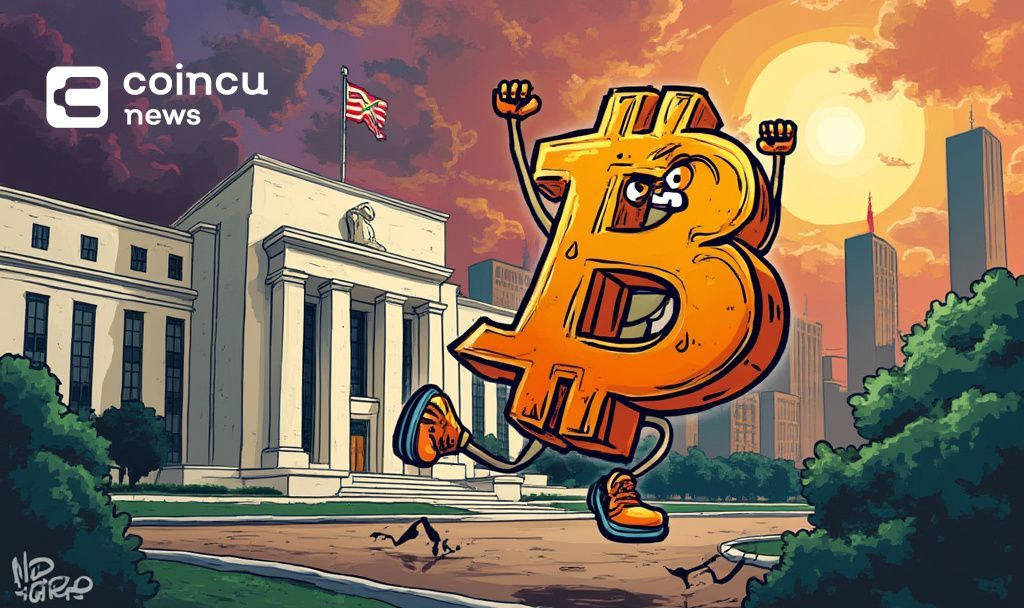 CaryptosHeadlines Media Has Launched Its Native Token CHT.
Airdrop Is Live For Everyone, Claim Instant 5000 CHT Tokens Worth Of $50 USDT.
Join the Airdrop at the official website,
CryptosHeadlinesToken.com
CaryptosHeadlines Media Has Launched Its Native Token CHT.
Airdrop Is Live For Everyone, Claim Instant 5000 CHT Tokens Worth Of $50 USDT.
Join the Airdrop at the official website,
CryptosHeadlinesToken.com

Kraken is working with Goldman Sachs and JPMorgan Chase to raise up to $1 billion in debt ahead of a planned public listing in early 2026, according to Bloomberg.
Talks are still early, but the two banks are already speaking with other financial institutions and direct lenders to pull together the funds. One of the people involved reportedly said the amount could end up being as low as $200 million, depending on how the lending discussions play out.
The debt raise isn’t for day-to-day operations. The money is meant to fund Kraken’s expansion, not to plug any holes. The company is also thinking about raising equity along with the debt, but that’s still undecided, and all terms, including the structure and the final amount, may change before anything is finalized, said Bloomberg.
Founded in 2011, the San Francisco-based company is officially called Payward Inc. and is run by Arjun Sethi and David Ripley, who are co-CEOs. Kraken wants to go public in the first quarter of 2026. That timeline follows a more open stance on crypto under President Donald Trump’s administration, which has relaxed enforcement by U.S. regulators, clearing the way for crypto companies like Kraken to explore listing options.
Kraken prepares for IPO with acquisitions and high revenue
Kraken just bought NinjaTrader, a retail-focused futures trading platform, for $1.5 billion last week. The company had already been talking about raising pre-IPO funding before the acquisition. In January 2025, Kraken disclosed $1.5 billion in revenue for 2024, a 128% increase from the previous year. The exchange also reported $380 million in adjusted EBITDA, claims to operate in over 190 countries, has more than 10 million users, and handles over $207 billion in trading volume per quarter, based on numbers published on its website.
Kraken issued a statement saying, “We are always exploring strategic paths toward Kraken’s Mission: accelerating the global adoption of crypto. We remain fully focused on investing in this goal.” The company did not respond directly to questions about the debt or IPO plans.
Kraken is also trying to bring a well-known company onto its board to help with the IPO push. That process is still in the discussion phase. So far, there are no signed agreements or official documents. The talks have involved only verbal exchanges about terms and valuations, according to the report.
Kraken has talked about going public for years, but earlier plans were delayed by the crypto market crash and legal fights with the U.S. Securities and Exchange Commission (SEC). In 2023, Kraken settled one case with the SEC, though it got sued again last year, this time accused of running an unregistered securities broker, a clearing agency, and an exchange. These were the same charges that the SEC filed against Coinbase, the biggest U.S. crypto exchange, and Kraken fought back against the lawsuit. The case was dismissed on March 3, as Cryptopolitan reported, which was just one more action that proved the new SEC isn’t the old SEC.
SEC pulls back on crypto lawsuits after Trump’s win
The SEC started the year by throwing out or pausing at least eight different crypto enforcement cases. The change came quickly after Gary Gensler stepped down as SEC Chair in late January. He is expected to be replaced by former commissioner Paul Atkins, with Mark Uyeda holding the job until the confirmation goes through on March 27. Trump had promised during his campaign to fire Gensler on day one. That promise was well received by the crypto industry, which had clashed with Gensler’s enforcement approach.
After Trump’s win, Bitcoin hit a record high, although it later dropped 25% following new tariff announcements that hit global markets. But Trump’s win signaled a shift that crypto executives had been hoping for.
John Reed Stark, who used to lead SEC enforcement and now works as a consultant, said, “It’s a multifaceted demolition of the most successful SEC enforcement program in history.” Stark added, “We’re going to grind to a screeching halt every single aspect of the SEC crypto enforcement program in a manner that’s not just unprecedented and unusual, it’s beyond imagination.”
Under former President Joe Biden, the U.S. was seen by many in the industry as a lost cause. Major companies like Coinbase and Ripple shifted hiring overseas. But things are swinging back. In January, Ripple posted 75% of its job openings in the U.S.
New SEC leadership sets up crypto taskforce
Since January 21, the SEC has overhauled its internal structure on crypto. The old crypto division was replaced with a Cyber and Emerging Technologies Unit, as well as a crypto taskforce that will work with people in the industry to help write new rules. The taskforce’s findings have already shaped agency decisions. The SEC cited its work when it asked to pause the Binance case last month.
The fight over whether crypto tokens are securities or commodities has cooled down. The SEC is not pushing that issue as hard anymore. After the election, Robinhood restarted trading of Solana and Cardano in the U.S. These were tokens that had been dropped in 2023 after lawsuits suggested they might be unregistered securities.
Just three weeks ago, the SEC clarified that meme coins are not considered securities. These are the joke coins that go viral online with no real utility. Donald Trump launched one himself in January, and its value briefly hit $15 billion before crashing by over 80%. His family is also tied to World Liberty Financial, a crypto platform that hasn’t launched yet but has already sold over $1 billion worth of tokens.
The SEC has also closed cases tied to people and companies who supported Trump. On Thursday, the agency and Justin Sun, a crypto investor who put $75 million into World Liberty Financial, jointly asked for a pause in the legal case against him. The day before, Gemini Trust, the crypto exchange owned by billionaire twins, said the SEC had closed its case without taking any action. The twins had tried to donate $1 million in Bitcoin to Trump’s campaign in 2024.
Even with Gensler out, the SEC says it’s not ignoring crime. The agency is now talking with both industry players and the public about what kind of enforcement approach to use going forward. But fraud won’t be left alone.
Christopher Giancarlo, who used to run the Commodity Futures Trading Commission (CFTC) and now advises crypto companies, said:
“They’re looking for the industry to return to a more traditional American ethos of the Internet, which is to build things and break things, and don’t ask permission, ask forgiveness.” He added, “There’s one major caveat to that, and that is don’t cheat people.”
Giancarlo said the CFTC could take on more responsibility under this new regulatory setup.
“When it comes to fraud, manipulation and market misconduct, you’ll continue to see a very strong enforcement activity,” he said. “Perhaps even more strong because it’ll be less distracted by going after firms for technical violations.”
Meanwhile, crypto’s still a mess in other places, specifically the scamming and security breaches. On Feb. 21, hackers stole $1.5 billion from Bybit, another big exchange. And in January, Argentina’s President Javier Milei got dragged into a crypto scandal. He had promoted a memecoin that ended up costing investors around $251 million in losses.
Cryptopolitan Academy: Want to grow your money in 2025? Learn how to do it with DeFi in our upcoming webclass. Save Your Spot












